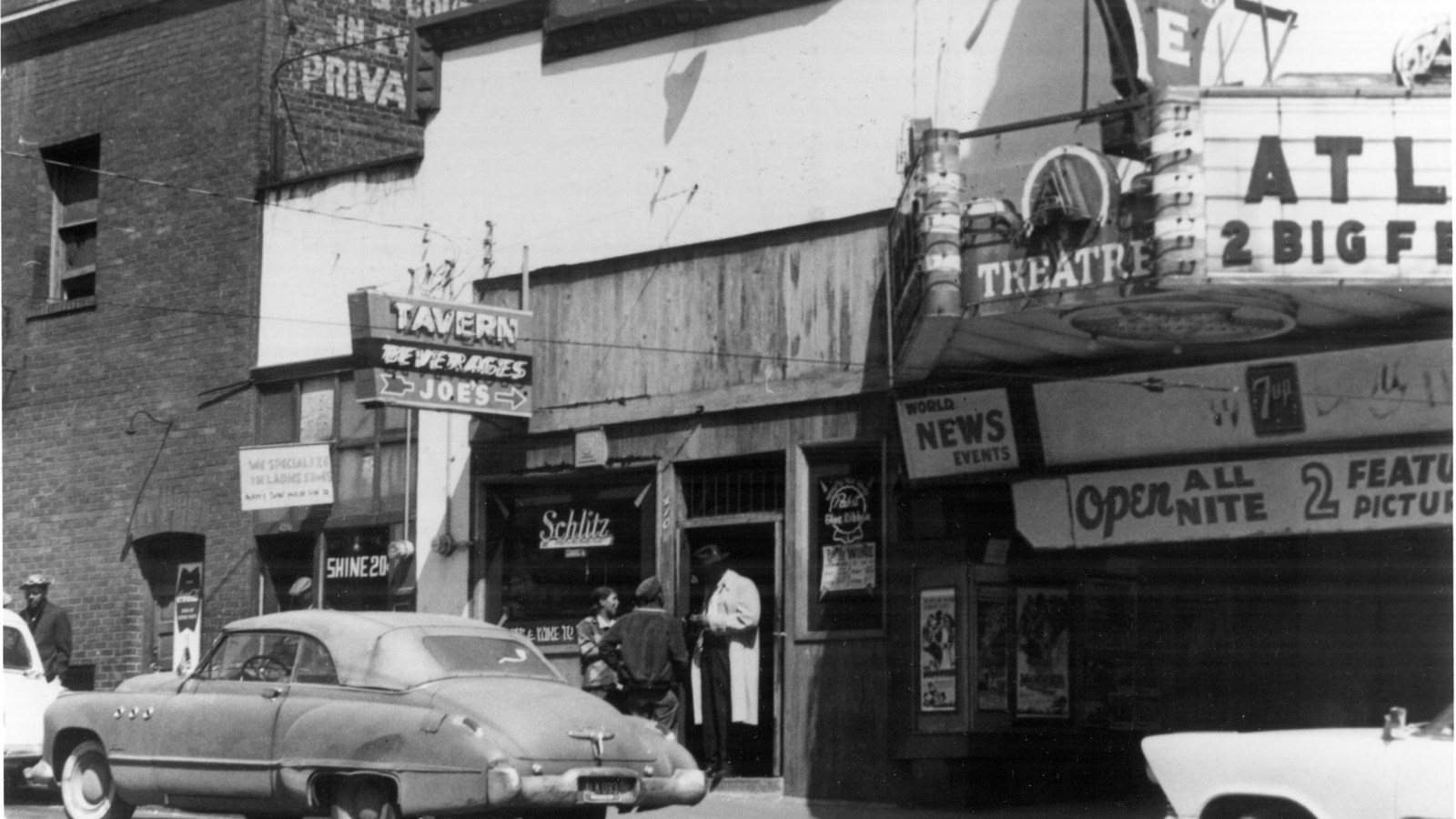Last updated: March 12, 2025
Place
Kokusai Theater (#2)

Seattle Public Library Collection
Quick Facts
Location:
412 Maynard Ave S
Significance:
Also known as: Atlas Theatre
Mile : 0.13
“I was mesmerized by those movies... that there had been such a time in Japanese history.” - Darrell Kitamura
“We were multicultural before it was cool.” - Elaine Kitamura
From “Growing Up at the Kokusai Theater,” by David Yamaguchi, North American Post, May 26, 2016
Opened in 1918 as the Atlas Theatre, it was renamed the Kokusai Theater in the 1960s. “Kokusai” means “international” in Japanese. A family favorite, both contemporary and historic films from Asia – especially the widely popular samurai films – were showcased on the big screen. Fridays through Sundays featured Japanese films, Mondays and Tuesdays were for Chinese films, and Wednesdays screened Filipino films. Amidst mainstream Hollywood stereotypical portrayals of Asians as the evil villain or helpless servant, this was one of the rare theaters in Seattle showing films with Asians as heroes and stars.
Over its history, the theater was run by three generations within the Kitamura family, founded by a benshi, a Japanese performer who provided live narration for silent films. Although the theater closed during World War II with the forced relocation of Japanese Americans and their incarceration in American concentration camps, the family was able to regain the property after the war. The Kokusai Theater ultimately closed in the 1980s. The building was torn down after the roof collapsed in 1997. The current building on the site is home to the Seattle Chinese Post and Northwest Asian Weekly community newspapers. A mural by artist Amy Nikaitani in Nihonmachi Alley (point #5) features the Kokusai Theater.
Video: Brush the Sky: Kokusai Theater
Brush the Sky: Kokusai Theater by Tamiko Thiel (augmented reality, digital prints) and Midori Kono Thiel (Japanese calligraphy, mylar hangings) was created in 2015 as a multimedia gallery installation and augmented reality public art project for the Wing Luke Museum. In this piece, Midori Kono Thiel talks about the Kokusai Theater and her daughter Tamiko Thiel’s favorite Japanese film star. Visit tamikothiel.com/brushthesky/to experience 18 sites around Seattle, augmented with Midori’s calligraphy.
“I was mesmerized by those movies... that there had been such a time in Japanese history.” - Darrell Kitamura
“We were multicultural before it was cool.” - Elaine Kitamura
From “Growing Up at the Kokusai Theater,” by David Yamaguchi, North American Post, May 26, 2016
Opened in 1918 as the Atlas Theatre, it was renamed the Kokusai Theater in the 1960s. “Kokusai” means “international” in Japanese. A family favorite, both contemporary and historic films from Asia – especially the widely popular samurai films – were showcased on the big screen. Fridays through Sundays featured Japanese films, Mondays and Tuesdays were for Chinese films, and Wednesdays screened Filipino films. Amidst mainstream Hollywood stereotypical portrayals of Asians as the evil villain or helpless servant, this was one of the rare theaters in Seattle showing films with Asians as heroes and stars.
Over its history, the theater was run by three generations within the Kitamura family, founded by a benshi, a Japanese performer who provided live narration for silent films. Although the theater closed during World War II with the forced relocation of Japanese Americans and their incarceration in American concentration camps, the family was able to regain the property after the war. The Kokusai Theater ultimately closed in the 1980s. The building was torn down after the roof collapsed in 1997. The current building on the site is home to the Seattle Chinese Post and Northwest Asian Weekly community newspapers. A mural by artist Amy Nikaitani in Nihonmachi Alley (point #5) features the Kokusai Theater.
Video: Brush the Sky: Kokusai Theater
Brush the Sky: Kokusai Theater by Tamiko Thiel (augmented reality, digital prints) and Midori Kono Thiel (Japanese calligraphy, mylar hangings) was created in 2015 as a multimedia gallery installation and augmented reality public art project for the Wing Luke Museum. In this piece, Midori Kono Thiel talks about the Kokusai Theater and her daughter Tamiko Thiel’s favorite Japanese film star. Visit tamikothiel.com/brushthesky/to experience 18 sites around Seattle, augmented with Midori’s calligraphy.
